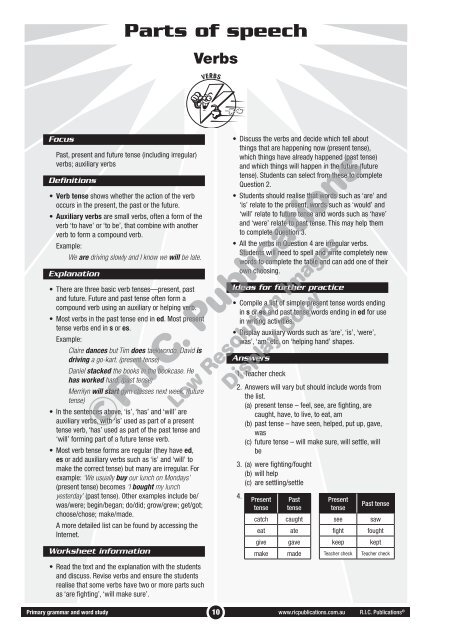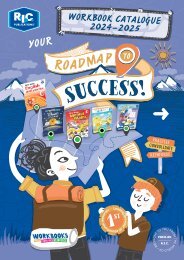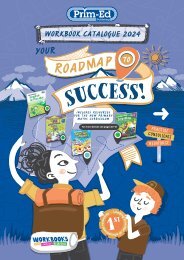RIC-20234 Primary Grammar and Word Study Year 3 – Parts of Speech
Create successful ePaper yourself
Turn your PDF publications into a flip-book with our unique Google optimized e-Paper software.
<strong>Parts</strong> <strong>of</strong> speech<br />
Verbs<br />
Focus<br />
Past, present <strong>and</strong> future tense (including irregular)<br />
verbs; auxiliary verbs<br />
Definitions<br />
• Verb tense shows whether the action <strong>of</strong> the verb<br />
occurs in the present, the past or the future.<br />
• Auxiliary verbs are small verbs, <strong>of</strong>ten a form <strong>of</strong> the<br />
verb ‘to have’ or ‘to be’, that combine with another<br />
verb to form a compound verb.<br />
Example:<br />
We are driving slowly <strong>and</strong> I know we will be late.<br />
Explanation<br />
• There are three basic verb tenses—present, past<br />
<strong>and</strong> future. Future <strong>and</strong> past tense <strong>of</strong>ten form a<br />
compound verb using an auxiliary or helping verb.<br />
• Most verbs in the past tense end in ed. Most present<br />
tense verbs end in s or es.<br />
Example:<br />
Claire dances but Tim does taekwondo. David is<br />
driving a go-kart. (present tense)<br />
Daniel stacked the books in the bookcase. He<br />
has worked hard. (past tense)<br />
Merrilyn will start gym classes next week. (future<br />
tense)<br />
• In the sentences above, ‘is’, ‘has’ <strong>and</strong> ‘will’ are<br />
auxiliary verbs, with ‘is’ used as part <strong>of</strong> a present<br />
tense verb, ‘has’ used as part <strong>of</strong> the past tense <strong>and</strong><br />
‘will’ forming part <strong>of</strong> a future tense verb.<br />
• Most verb tense forms are regular (they have ed,<br />
es or add auxiliary verbs such as ‘is’ <strong>and</strong> ‘will’ to<br />
make the correct tense) but many are irregular. For<br />
example: ‘We usually buy our lunch on Mondays’<br />
(present tense) becomes ‘I bought my lunch<br />
yesterday’ (past tense). Other examples include be/<br />
was/were; begin/began; do/did; grow/grew; get/got;<br />
choose/chose; make/made.<br />
A more detailed list can be found by accessing the<br />
Internet.<br />
Worksheet information<br />
• Read the text <strong>and</strong> the explanation with the students<br />
<strong>and</strong> discuss. Revise verbs <strong>and</strong> ensure the students<br />
realise that some verbs have two or more parts such<br />
as ‘are fighting’, ‘will make sure’.<br />
• Discuss the verbs <strong>and</strong> decide which tell about<br />
things that are happening now (present tense),<br />
which things have already happened (past tense)<br />
<strong>and</strong> which things will happen in the future (future<br />
tense). Students can select from these to complete<br />
Question 2.<br />
• Students should realise that words such as ‘are’ <strong>and</strong><br />
‘is’ relate to the present, words such as ‘would’ <strong>and</strong><br />
‘will’ relate to future tense <strong>and</strong> words such as ‘have’<br />
<strong>and</strong> ‘were’ relate to past tense. This may help them<br />
to complete Question 3.<br />
• All the verbs in Question 4 are irregular verbs.<br />
Students will need to spell <strong>and</strong> write completely new<br />
words to complete the table <strong>and</strong> can add one <strong>of</strong> their<br />
own choosing.<br />
Ideas for further practice<br />
• Compile a list <strong>of</strong> simple present tense words ending<br />
in s or es <strong>and</strong> past tense words ending in ed for use<br />
in writing activities.<br />
• Display auxiliary words such as ‘are’, ‘is’, ‘were’,<br />
was’, ‘am’ etc. on ‘helping h<strong>and</strong>’ shapes.<br />
Answers<br />
1. Teacher check<br />
2. Answers will vary but should include words from<br />
the list.<br />
(a) present tense <strong>–</strong> feel, see, are fighting, are<br />
caught, have, to live, to eat, am<br />
(b) past tense <strong>–</strong> have seen, helped, put up, gave,<br />
was<br />
(c) future tense <strong>–</strong> will make sure, will settle, will<br />
be<br />
©R.I.C. Publications<br />
Low Resolution Images<br />
Display Copy<br />
3. (a) were fighting/fought<br />
(b) will help<br />
(c) are settling/settle<br />
<strong>Primary</strong> grammar <strong>and</strong> word study 10<br />
www.ricpublications.com.au R.I.C. Publications ®<br />
4.<br />
Present<br />
tense<br />
Past<br />
tense<br />
Present<br />
tense<br />
Past tense<br />
catch caught see saw<br />
eat ate fight fought<br />
give gave keep kept<br />
make made Teacher check Teacher check


